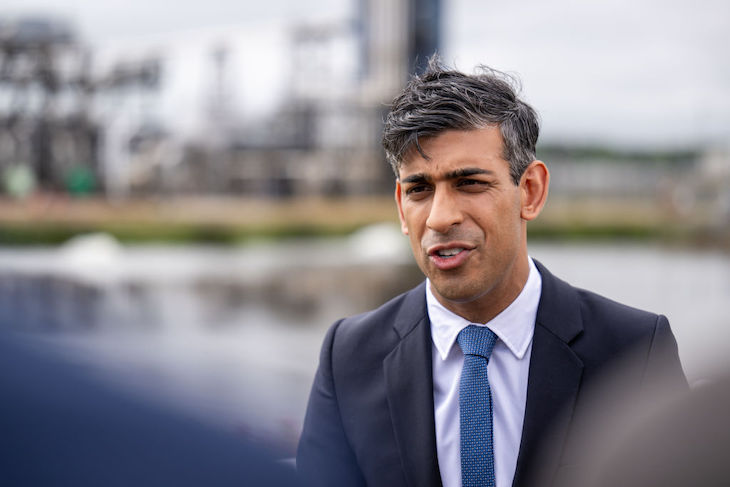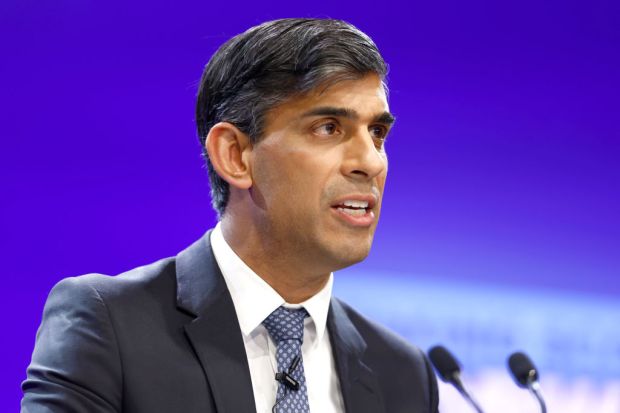It is quite right that the Prime Minister has chosen to approve new licences for oil and gas extraction in the North Sea, in spite of the bitter reaction from climate activists, the Labour party – and some of his own MPs.
Chris Skidmore, who just recently completed a review of net zero policies on behalf of the government, said this week that the decision to award new licences ‘is on the wrong side of the future economy that will be founded on renewable and clean industries and not fossil fuels’.
Yet the Prime Minister is not retrenching on investment in renewable energy; he is hedging the government’s bets. While wind and solar already play a large role in electricity generation in Britain, their contribution to the United Kingdom’s total energy needs remains in single figures. It is certain that fossil fuels will remain a large part of the nation’s energy mix in the short to medium term, and far from certain that they will not continue to do so in the longer term without compromising efforts to achieve net zero carbon emissions.
Critics of the decision to award new licences tend to ignore the global picture
The technology which would make long-term fossil fuel consumption acceptable – carbon capture, utilisation and storage (CCUS) – has not yet been proven viable. Further technological breakthroughs are needed for sufficiently large quantities of carbon dioxide to be taken from the exhaust streams of power stations. But CCUS is a lot more established than many of the technologies that we will require to reach net zero, having been used by the oil and gas industry for half a century.
If CCUS can be scaled-up and rolled out across industry it would make the job of decarbonising many sectors, such as steel and cement production, a lot easier. That is why Rishi Sunak believes it to be worth investing £20 billion of public money to further develop carbon capture system. It is one of the technologies – unlike mass producing electric car batteries, for example, or manufacturing wind turbines – in which Britain could still realistically take a lead.
It is notable that Labour has said that, while it would not issue new licences for oil and gas, it would not seek to withdraw licences that have been issued by the current government. Critics of the decision to award new licences tend to ignore the global picture. This summer, according to the International Energy Agency, global consumption of oil and gas reached a record high – confounding those who have for many years predicted that we would have passed ‘peak oil’ by now. There may be rapid growth in investment in renewables, but fossil fuels are far from being on the way out. They remain a reliable and rich source of power which will be hard to replace.
Even if we could move to 100 per cent renewable energy, fossil fuels would still be the most effective source of materials for plastics, fertilisers and other goods. There are some, such as Myles Allen, professor of geosystem science at Oxford University, who believe that CCUS could yet turn out to be the fastest and most straightforward route to net zero.
Among the arguments regularly trotted out against new licences for oil and gas is the idea that the fuel will be sold on global markets and therefore do nothing to aid energy security or reduce energy prices for UK consumers. But that ignores the fact that UK-produced gas will much more competitive on UK markets because of far lower transportation costs. Since the decline of the North Sea, Britain has become increasingly reliant on liquified natural gas (LNG) imported by ship from the US and Qatar, which now accounts for around a fifth of UK supply. Yet it is an expensive business to liquify, transport and then de-liquify gas – the process consumes around a tenth of the energy contained within the gas. It would be better from an environmental as well as an economic perspective were more gas to be produced locally.
It is good that the government is no longer allowing green ideology to blind it to the needs of the economy in quite the way it has been for the past few years, but it should not stop with the oil and gas industry. This week, the Purchasing Managers Index (PMI) showed a sharp retrenchment in manufacturing. The decline of UK manufacturing has been a decades-old phenomenon with several causes, but the high cost of energy over the past year or so has delivered a harsh blow to the sector.
A lot comes down to the structure of our electricity market, which was never designed to cope with large quantities of intermittent wind and solar energy. Under what is known as ‘marginal cost pricing’ everyone has to pay vastly inflated costs for electricity whenever gas power stations have to be turned on at short notice to make up for a shortage of sun and wind. The government’s own analysis of electricity prices for industrial users shows, as a result, UK factories pay more for their power than any other country, at 13.66 pence per kWh, including taxes, compared with the equivalent of 9.89 pence in France. This has made a lot of energy entrepreneurs very rich without producing efficiencies in the market.
It is puzzling why the government has for so long not sought to reform this clearly broken system, choosing instead to place windfall levies on the owners of wind and solar farms and handing back to electricity customers some of that money. It would be so much better if the whole market could be reformed so that it works to bring prices down. That should be Rishi Sunak’s objective as he seeks to reset UK energy policy.
Got something to add? Join the discussion and comment below.
Get 10 issues for just $10
Subscribe to The Spectator Australia today for the next 10 magazine issues, plus full online access, for just $10.




















Comments
Don't miss out
Join the conversation with other Spectator Australia readers. Subscribe to leave a comment.
SUBSCRIBEAlready a subscriber? Log in